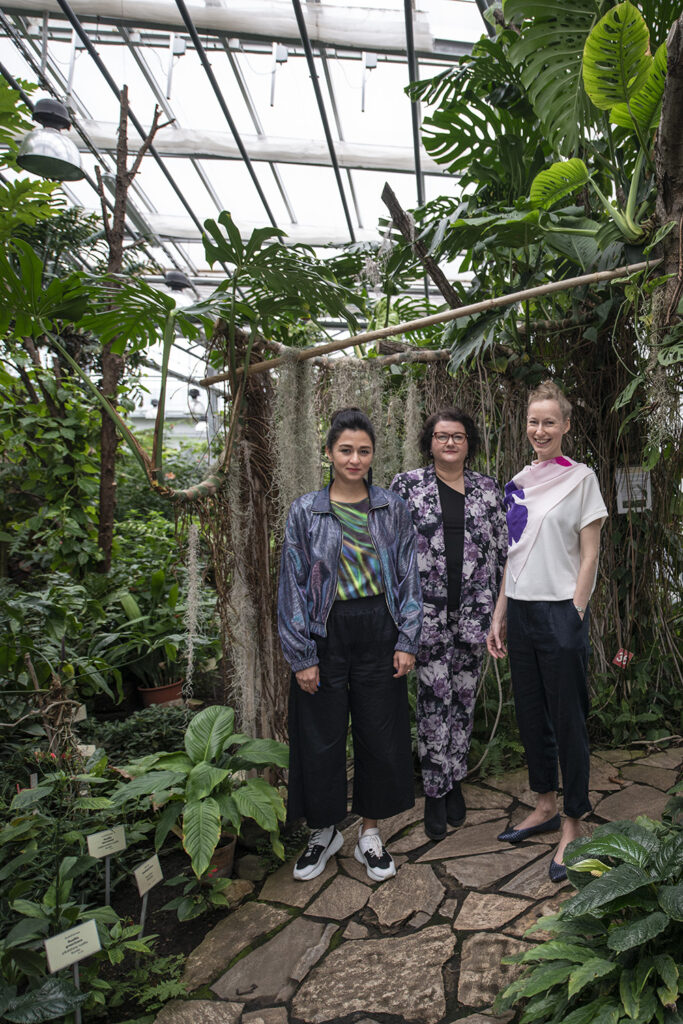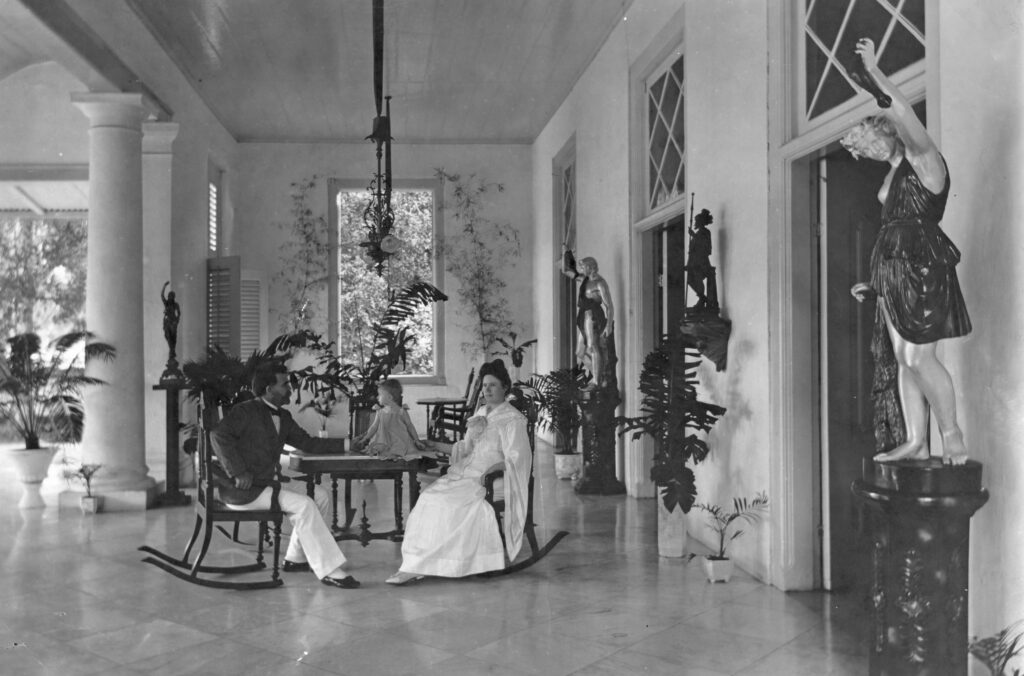
For Estonia’s exhibition for the 59th International Art Exhibition – La Biennale di Venezia, Kristina Norman and Bita Razavi will present, in close collaboration with curator Corina L. Apostol, Orchidelirium. An Appetite for Abundance – a multi-layered ecocritical display within the Rietveld Pavilion in the Giardini di Castello Biennale.
“A flowering orchid is a sensation. There is something fairy-tale-like about the term orchid. Awesome characteristics are attributed to the flower. The positive aspect about these fairy tales is that orchids have become desirable (…) When an orchid flowers, it is discussed in newspapers.” These words, written over a century ago, belong to the Estonian writer, photographer, and topographer, Andres Saal who, together with his partner Emilie Rosalie Saal, lived on the Island of Java, then part of the Dutch East Indies. Today orchids have become so commonplace, yet still widely cultivated and collected, that it requires a stretch of the imagination to fathom the Orchidelirium or orchid fever that gripped Europe so long ago. Yet, behind the allure and beauty of tropical orchids, lies a complex and dark story of colonial ecological exploitation with lasting repercussions. In a carefully crafted interplay between the scientific, historical, and aesthetic, Kristina Norman and Bita Razavi in dialogue with curator Corina L. Apostol critically explore the landscapes in pre-independence Estonia and in Indonesia during the late colonial period, and the ecological impact it continues to have to this day.
The artists will produce an immersive environment, featuring a film trilogy by Kristina Norman and a performative spatial intervention by Bita Razavi. Norman and Razavi’s research-based practices will closely examine the historical experience of serfdom in Estonia from which the Saals emerged, their lived experiences in Indonesia, and the important role they played in Dutch colonial history. Orchidelirium reflects on the difficulties of entangled histories and the relationships between “perpetrators” and “victims” in a botanical pavilion where the viewer encounters different characters of the colonial past and present. It offers an in-depth and multifaceted perspective on how the botanical history shared by the Netherlands, Estonia, and Indonesia, is closely linked to their colonial relationship. As Estonia was then part of the Russian Empire, the story of Emilie Saal (1871–1954) is one of a colonized subject becoming and passing as a white coloniser in a foreign land, thus her work plays an integral role in unraveling the threads of these entangled histories.
“While botany has received little systematic attention within art history, its visibility and significance have grown in relation to the threats of environmental exploitation and destruction. By engaging contemporary artists’ visual and political engagement with botanical legacies and environmental conditions globally and highlighting political, and cultural developments—this exhibition offers a significant contribution to the intersecting fields of botany, visual culture, decoloniality, and environmental politics, during a time when such cultural strategies and proposals are urgently needed,” says curator, Corina L. Apostol.
Estonia has participated in La Biennale di Venezia since 1997 with pavilions at various locations in the city of Venice. For the upcoming biennale, the Mondriaan Fund has invited Estonia to exhibit as guests in their historical Rietveld pavilion in the heart of the Giardini. Estonia’s participation in the Venice Biennale is commissioned and produced by the Estonian Centre for Contemporary Art, co-produced with the Tallinn Art Hall and Rühm Pluss Null OÜ and funded by the Estonian Ministry of Culture. CCA is the commissioner of the Estonian Pavilion at the Venice Biennale since 1999. (Link to CCA page with press release about the Pavilion exchange).
For information about CCA and the Estonian entry for 2022, please contact:
Head of communication of the Estonian Pavilion, Kaarin Kivirähk: kaarin@cca.ee / +372 5394 7169 or
International PR-advisor, Alexia Menikou: am@alexiamenikou.com / +44 (0) 7958 454 111

Kristina Norman (1979) is a Tallinn based artist and documentary maker, explores the converging trajectories of national identity, politics of memory and public space. Norman’s most recent work is a poetical documentary performance entitled “Lighter Than Woman”, whose protagonists are Eastern European women who work in Italy as elderly care workers and who overcome the Gravity of life in a metaphorical and literal sense. This is Norman’s second time to present her work at the Venice Biennale – in 2009 she represented Estonia with her solo project “After-War“.
Bita Razavi (1983) is a multidisciplinary artist best known for her autofictional practice centered around observations and reflections on a variety of everyday situations. While working as a cleaner in Helsinki, Razavi photographed traces of design in Finnish homes observing them as manifestations of national identity (2010). She married her schoolmate in her studio at the Finnish Academy of Fine Arts to address Finnish immigration policies (2011) and spent four years renovating two houses in Estonia to study Soviet renovation materials throughout years of changing economic and political situations (2019). Razavi has exhibited in Biennials, won prizes and has her works in museum collections among all other achievements that are expected from any accomplished artist.
About Emilie Rosalie Saal
Emilie Rosalie Saal (1871–1954) was born in Tartu (then part of the Russian Empire), studied art in Petrograd (St. Petersburg), then joined Andes Saal in Java between 1899 and 1920. In many ways her story is similar to that of other European noblewomen who pursued botanical art as a pastime and occupation. At the same time, her accomplishments were particularly significant because, unlike many of her upper-class counterparts, she was able to continue to pursue art by traveling to Indonesia. Saal challenged convention by arranging trips on the islands to study tropical plants while becoming impressively proficient in drawing the fine details of local plants at the Buitenzorg Botanical Gardens. In 1926, after emigrating with her family to the United States, her collection of over 300 works was exhibited at the Los Angeles County Museum of Science and Art and widely praised by the press of the time.
About Corina L. Apostol
Corina L. Apostol (1984) is a curator at the Tallinn Art Hall and the co-curator and coordinator of the international collaborative, practice-based research project, “Beyond Matter – Cultural Heritage on the Verge of Virtual Reality”. Recently, she curated the Shelter Festival: “Cosmopolitics, Comradeship, and the Commons,” at the Space for Free Arts/ University of the Arts Helsinki (2019). Previously, she was the Andrew W. Mellon Fellow at Creative Time, where she co-edited the publication Making Another World Possible: 10 Creative Time Summits, 10 Global Issues, 100 Art Projects (2019). She has been longlisted for the Kandinsky Prize (2016) and the Sergey Kuryokhin Prize (2020).
About Estonian Centre for Contemporary Art (CCA)
Estonian Centre for Contemporary Art (CCA) is the oldest centre of expertise for contemporary art in Estonia. Creating opportunities and collaborations for Estonian artists and the Estonian art scene since 1992, CCA is also the commissioning organisation of the Estonian pavilion at the Venice Biennale since 1999. CCA is one of the main facilitators of international collaborations in the Estonian art scene through connecting artists, curators, critics and institutions. CCA also curates and organises exhibitions and other art events and publishes Estonian art news for our international network. CCA is a non-profit non-governmental organisation that is mostly supported by public resources. The main funder of CCA is the Estonian Ministry of Culture.